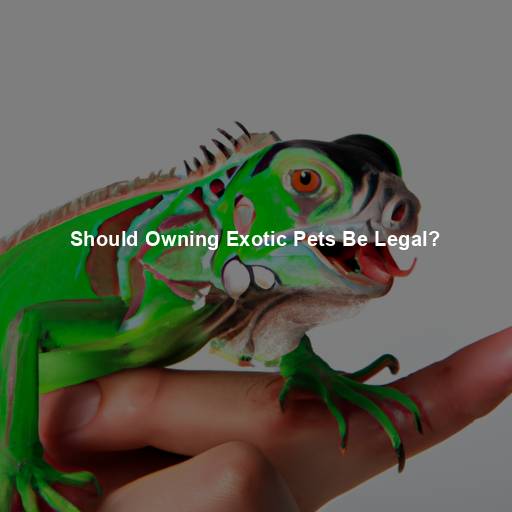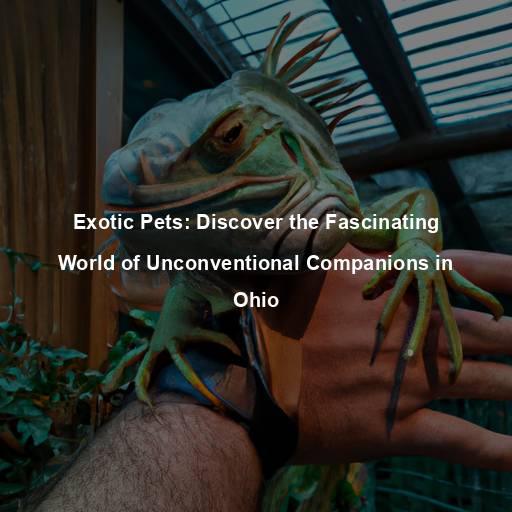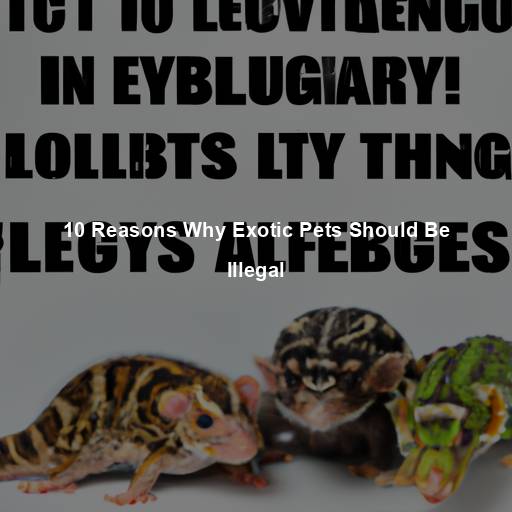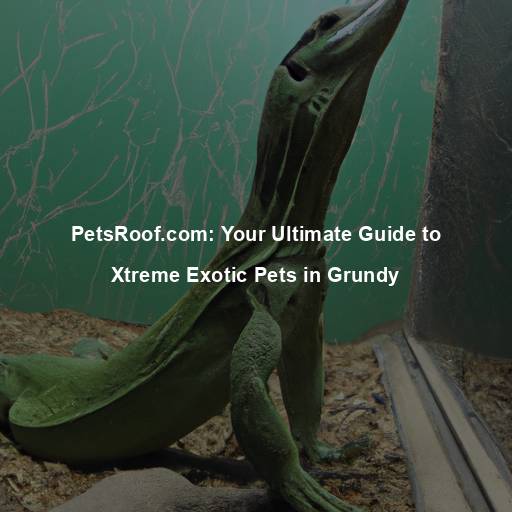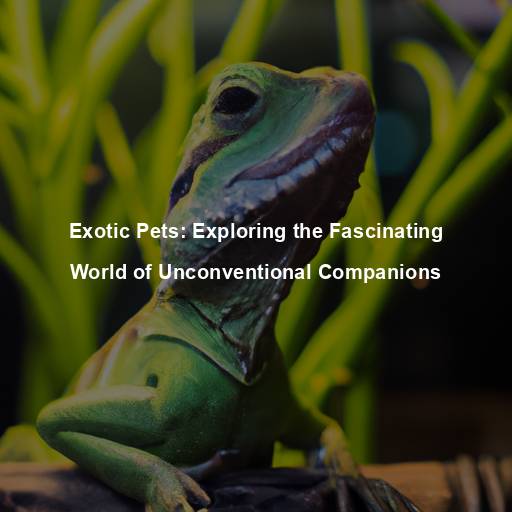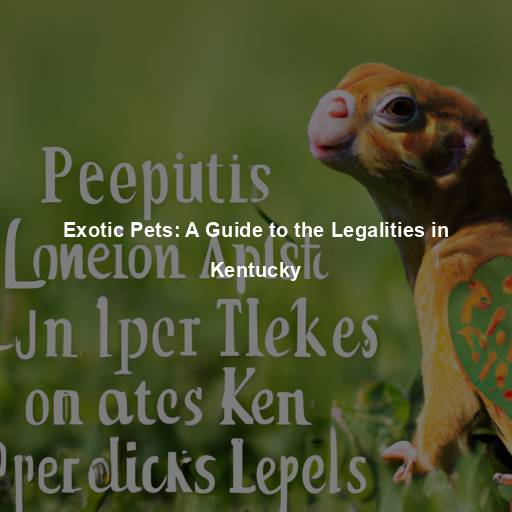Should Owning Exotic Pets Be Legal?
Last Updated on October 31, 2023 by Evan
Contents [hide]
- 1 Exploring the Complex World of Exotic Pets Ownership
- 1.1 Unveiling the Fascination of Exotic Pets
- 1.2 The Allure of Owning Exotic Pets
- 1.3 The Ethical Dilemmas of Exotic Pet Ownership
- 1.4 The Impact on Conservation Efforts
- 1.5 Public Safety Concerns
- 1.6 The Role of Responsible Ownership
- 1.7 Balancing Personal Freedom and Animal Welfare
- 1.8 Promoting Alternative Forms of Appreciation
- 1.9 The Pros of Exotic Pet Ownership
- 1.10 The Cons of Exotic Pet Ownership
- 1.11 Regulation and Legislation
- 1.12 Responsible Exotic Pet Ownership
- 1.13 The Role of Exotic Animal Sanctuaries
- 1.14 A Global Perspective
- 1.15 Finding Common Ground
- 1.16 Economic Benefits
- 1.17 Economic Drawbacks
- 1.18 Regulation and Economic Impact
- 1.19 The Exotic Pet Trade and Conservation
- 1.20 Public Perception and Consumer Behavior
- 1.21 Balancing Economic Interests and Animal Welfare
- 2 FAQs: Should Owning Exotic Pets Be Legal?
- 2.1 What defines an exotic pet?
- 2.2 Why do people choose to own exotic pets?
- 2.3 What are the potential benefits of owning exotic pets?
- 2.4 What are the potential risks associated with owning exotic pets?
- 2.5 Should owning exotic pets be legal?
- 2.6 How can potential risks be mitigated if exotic pet ownership is legal?
- 2.7 What countries have laws regarding exotic pet ownership?
Exploring the Complex World of Exotic Pets Ownership
Unveiling the Fascination of Exotic Pets
For centuries, the allure of exotic pets has enthralled individuals who find solace in the intriguing and extraordinary. The vibrant charm of colorful reptiles and the regal presence of majestic big cats have stirred the hearts of animal enthusiasts worldwide. These remarkable creatures embody the inherent mysteries and diversity of the vast animal kingdom, inviting us on a thrilling journey brimming with wonder and excitement. Nevertheless, the contentious issue of whether the legal ownership of exotic pets should prevail continues to puzzle and divide society, sparking fervent discussions and passionate debates.
The Allure of Owning Exotic Pets
The mere thought of having an unconventional pet can cast a spell on countless people. There’s an undeniable charm in cohabiting with a creature that veers far from the run-of-the-mill, a creature that throws normalcy out the window. Exotic pets boast mesmerizing looks, intriguing quirks, and an uncanny knack for creating a buzz among your social circles. Owning one can become a badge of honor, an endless source of joy that sets you apart from the crowd.
The Ethical Dilemmas of Exotic Pet Ownership
Owning exotic pets can certainly be alluring, but it is imperative to confront the moral quandaries that accompany this trend. The welfare and happiness of these animals are at the core of the ethical discussion. These fascinating creatures necessitate specialized environments and diets that may prove perplexing in a domestic setting. Consequently, their intricate needs might go unaddressed, resulting in health complications, heightened anxiety, and a compromised overall existence.
The Impact on Conservation Efforts
As we delve into the realms of the legality surrounding the ownership of exotic pets, let us not forget the perplexing impact it has on conservation efforts. Our surroundings are bursting with diverse species that are already grappling with grave threats such as habitat loss, the ever-looming climate change, and the wicked haunts of poaching. Surrendering to the allure of the commercial trade and ownership of these remarkable creatures could inadvertently fan the flames, worsening these existential threats and accelerating the depletion of wild populations. It is unquestionably vital that we shift our focus towards safeguarding these magnificent beings in their natural habitats and rally behind effective conservation measures, rather than perpetuating their captivity in the name of personal possession.
Public Safety Concerns
When it comes to the ownership of exotic pets, there are ethical concerns, but let’s not forget about the real-life dangers they can pose to public safety. While these unique creatures may seem tame and innocent, their wild instincts can often come out of nowhere and catch us off guard. Countless tales of escaped or mistreated exotic pets have emerged, leaving us perplexed and heartbroken by the injuries, and sadly, even deaths that have occurred. So, before we legalize the ownership of these captivating creatures, let’s carefully weigh the risks involved, not only for the owners but also for the unsuspecting communities around them.
The Role of Responsible Ownership
Contemplating the intricate tapestry of owning exotic pets, one cannot deny the riveting arguments against it. Yet, a glimmer of perplexity lingers in the air, urging us to unveil an alternative perspective. A journey into the abyss of responsible ownership reveals a realm filled with promise, where the bold dance of education and awareness harmonizes with the whisperings of caution. Only through the lens of stringent regulations and licensing requirements can we hope to navigate this enigmatic terrain, guiding individuals towards a conscious commitment to bestow upon these extraordinary creatures the care, enclosures, and veterinary attention they so rightfully deserve.
Balancing Personal Freedom and Animal Welfare
In the ongoing discourse about the ethical aspects of possessing unconventional pets, divergent perspectives emerge, sparking bewilderment and intrigue. At the heart of this intricate debate lies the intricate dance between personal autonomy and the welfare of our fellow creatures. Advocates contend that individuals should exercise their freedom in selecting their animal companions, while their counterparts accentuate the imperative to prioritize the creatures’ overall welfare. Unraveling this enigmatic tapestry entails navigating the maze of competing principles to develop comprehensive regulations that safeguard both the liberties of individuals and the wellbeing of these extraordinary inhabitants of our world.
Promoting Alternative Forms of Appreciation
In a world captivated by the allure of owning exotic pets, perhaps it’s time to embrace a different perspective. Let’s shift our gaze away from pristine cages and towards a realm of possibility—an enchanting world where conservation and appreciation coexist. Zoos, wildlife sanctuaries, and educational programs stand as beacons of hope, offering a chance to behold these extraordinary creatures up close while nurturing the delicate balance of our planet. By venturing down this uncharted path, we not only protect the welfare of these animals but also become stalwart guardians of their future.
The Pros of Exotic Pet Ownership
- Unique Companionship: Exotic pets offer a distinct form of companionship that can be enriching and fulfilling for their owners. The bond formed with these animals can be a source of joy and emotional connection.
Discover the captivating realm of exotic pets, where education intertwines with fascination. By welcoming these unique creatures into your life, you embark on an extraordinary journey, delving into the intricate secrets of diverse species, their enigmatic habitats, and bewildering behaviors. Immerse yourself in this firsthand odyssey, where knowledge flourishes, fostering an unyielding reverence for wildlife and igniting the flames of conservation advocacy.
- Personal Growth: Caring for an exotic pet can promote personal growth and responsibility. Owners must develop patience, dedication, and problem-solving skills to meet the specific needs of their unique pets.
The Cons of Exotic Pet Ownership
The delicate equilibrium of our planet’s ecosystems becomes a victim of our insatiable desire to possess exotic pets. By plundering their natural habitats and thrusting them into captivity, we inadvertently disrupt the ecological harmony that sustains these fragile ecosystems. This chain reaction creates a domino effect, ultimately leading to the decline of wild populations and the irreversible damage of our shared natural heritage.
- Health and Welfare Concerns: Exotic pets often have complex dietary and environmental requirements that can be challenging to meet in a domestic setting. Inadequate care and improper conditions can lead to physical and psychological health issues for these animals.
As nature enthusiasts are captivated by the allure of exotic pets, the intricate dance between fascination and unforeseen danger unfolds. The very ownership of these ethereal creatures offers a tantalizing cocktail of excitement and uncertainty, where their unpredictable behaviors and enigmatic physical prowess become a potent source of both awe and trepidation. Yet, as the threads of ownership intertwine with the fabric of human lives, the shadows of risk loom large, challenging our ability to navigate the delicate balance between the captivating allure of these creatures and the paramount importance of public safety. In this intricate tapestry, the essence of responsible management assumes a paramount role, as the consequences of not treading this path reveal glimpses of an unsettling future.
Regulation and Legislation
When it comes to the delicate matter of exotic pet ownership, there’s no room for complacency. By enacting robust licensing and permitting systems, we can introduce a much-needed layer of accountability. From stringent enclosures to mandatory veterinary care and educational courses, these regulations will sift out the committed guardians from the irresolute, offering a glimmer of hope in an otherwise perplexing landscape.
In certain jurisdictions, there exists a rather bewildering but thought-provoking strategy to prohibit the keeping of particular exotic species. This unprecedented measure is put in place with the perplexing goal of averting any potential hazards or undesirable consequences that may arise from having these certain creatures as pets. The intention is to safeguard our domestic sphere from the unsuitability of these animals and to shield our delicate ecosystems from their imposing and formidable presence.
Responsible Exotic Pet Ownership
Education and awareness are crucial when it comes to exotic pets. It is important to equip prospective owners with comprehensive knowledge and resources to make informed decisions. By offering insights into the unique needs, behaviors, and challenges associated with each species, individuals can better prepare themselves for the responsibilities that come with owning an exotic pet.
- Supporting Conservation Efforts: Redirecting the fascination with exotic pets towards supporting conservation initiatives can contribute to the preservation of these species in their natural habitats. Encouraging donations, volunteering, or participating in wildlife rehabilitation programs can make a positive impact.
The Role of Exotic Animal Sanctuaries
- Rescue and Rehabilitation: Exotic animal sanctuaries play a crucial role in providing a safe haven for animals that have been rescued from improper care, illegal trade, or abandonment. These sanctuaries focus on rehabilitation, enrichment, and promoting the welfare of these animals.
Exotic animal sanctuaries do more than just provide a safe haven for our wild relatives; they also play a vital role in education and advocacy. These sanctuaries serve as captivating classrooms where people can immerse themselves in the wonders of the animal kingdom and learn about the complexities of exotic pet ownership. By offering guided tours and engaging outreach programs, they ignite a spark of curiosity, fostering a deeper appreciation for wildlife and encouraging conversations about conservation and ethical choices. Step inside these sanctuaries, and embark on a journey of discovery, where perplexity transforms into understanding and burstiness gives way to a newfound passion for protecting our precious creatures.
A Global Perspective
- International Regulations: The legal status of exotic pet ownership varies across different countries and regions. Some nations have banned the practice entirely, while others have implemented strict regulations to ensure the welfare of both animals and humans.
Cultural disparities play a pivotal role in the intricate tapestry of exotic pet ownership, as attitudes and traditions diverge across the globe. Navigating the convoluted landscape of exotic pet legality necessitates a deep appreciation and reverence for these cultural lenses. It is through this lens that we can fully grasp and unravel the bewildering enigma of exotic pet ownership worldwide.
Finding Common Ground
- Balancing Interests: Achieving a consensus on the issue of exotic pet ownership requires open dialogue and the consideration of diverse viewpoints. Striking a balance between personal freedom, animal welfare, and conservation efforts is essential to create effective and fair regulations.
In the fast-paced world of animal welfare, conservation biology, and legislation, the power of collaboration and research cannot be underestimated. When experts in these diverse fields come together, magic happens – ideas clash, perspectives collide, and groundbreaking solutions are born. By engaging in ongoing research and fostering collaboration, we pave the way for informed decision-making and the development of evidence-based policies that can truly make a difference in the lives of our furry friends. It is through this intricate web of knowledge exchange that we create a powerful ripple effect, driving change and ensuring a brighter future for all creatures great and small.
Economic Benefits
As the demand for exotic pets continues to rise, the pet industry experiences unprecedented growth, fueling a thriving market for animal sales, essential supplies, and specialized services. This surge in popularity not only bolsters revenue streams but also creates employment opportunities and stimulates economic activity. The pet industry’s upward trajectory remains a source of fascination and intrigue, juxtaposing the wonder of exotic animal ownership with the complexities of an expanding market.
-
Sustainable Fashion Revolution: The fashion industry witnesses a paradigm shift as consumers increasingly embrace sustainable fashion choices, prioritizing ethical practices and eco-friendly materials. This revolution ushers in a wave of innovative designers and brands committed to addressing the detrimental impact of fast fashion on the environment. The industry’s perplexing transformation gives rise to a thought-provoking narrative that intertwines style with sustainability, offering a burst of hope for a more conscious fashion future.
-
Mental Health Awareness: Society grapples with the complex and often misunderstood topic of mental health, sparking important conversations and initiatives aimed at destigmatizing these conditions. From celebrities to everyday individuals, profound personal stories are catapulted into the spotlight, begging society to question existing perceptions and support those struggling with mental health challenges. This surge of awareness displays a burst of empathy and compassion, leaving us perplexed by the profound impact mental health has on our collective well-being.
-
Future of Technology: The relentless march of technology leaves us in a perpetual state of wonder and bewilderment, as each new advancement shapes the trajectory of our future. From artificial intelligence to quantum computing, the possibilities seem limitless, captivating our imagination and challenging our understanding of what lies ahead. This fast-paced evolution of technology injects bursts of excitement and perplexity into our lives, propelling us into a future brimming with innovative possibilities.
The allure of exploring the vibrant world of exotic animals is undeniable. From the breathtaking zoos that showcase these captivating creatures to the sprawling wildlife parks where nature enthusiasts can immerse themselves in the wonders of the animal kingdom, these exceptional destinations leave visitors in awe. Not only do they contribute to the thriving local tourism industry, but they also serve as vital sources of income for the communities they call home. Embark on an unforgettable journey, where boundless curiosity intertwines with the preservation of precious wildlife.
Economic Drawbacks
When it comes to owning exotic pets, the monetary aspect can be a real head-scratcher. From the specialized care and peculiar diets they require, to the extravagant habitats they need to thrive, the expenses can quickly spiral out of control. Adding insult to injury, the bills for their food, vet visits, and the necessary permits can be a real kick in the wallet. All in all, the costs of ownership can leave pet owners feeling perplexed and wallet-weary.
The world of exotic pets is enmeshed in a web of secrecy, where demand fuels a thriving black market. Behind closed doors, illegal and unethical practices run rampant, tarnishing not only the well-being of innocent animals but also providing a breeding ground for organized crime and rampant smuggling. The perplexing truth is that our fascination with the extraordinary has inadvertently ushered in a dark era of exploitation and danger.
Regulation and Economic Impact
- Revenue from Permits and Licensing: Governments can generate revenue by implementing permit fees and licensing requirements for exotic pet ownership. This income can be used to fund conservation efforts, wildlife rehabilitation centers, and enforcement of animal welfare laws.
The interplay between the regulation of exotic pet ownership and its potential impact on job creation and economic stimulus can be an intriguing and convoluted web. Delving into the realm of wildlife management, veterinary care, and conservation research, these associated fields hold the promise of generating employment opportunities in a fascinating manner. Moreover, the positive ripple effect on local communities cannot be disregarded, as economic growth and development become intertwined with the complex tapestry of exotic pet ownership oversight.
The Exotic Pet Trade and Conservation
Discover the marvelous world of sustainable alternatives, where the beauty of nature merges with economic opportunities for local communities. Embrace the wonders of ecotourism and responsible observation of wildlife, as these splendid alternatives take the spotlight, preserving natural habitats and mitigating the impact of the exotic pet trade. Let us embark on a journey filled with awe and possibilities, as we unravel the secrets of a harmonious coexistence with our wild counterparts.
In an increasingly fragile world where the fate of many species hangs in the balance, it is vital for us to rally behind conservation organizations that tirelessly strive to safeguard endangered species and their habitats. By channeling our resources and funding towards these dedicated entities, we can play a pivotal role in preserving the delicate balance of nature. Through engaging in partnerships, making generous donations, and spreading awareness through impactful campaigns, we can actively contribute to the perplexing challenge of protecting our planet’s diverse ecosystems.
Public Perception and Consumer Behavior
In this day and age, it becomes increasingly crucial to enlighten the masses and shed light on the intricate web of morals and ecological consequences that entangle the exotic pet industry. By imparting knowledge and cultivating consciousness, we aim to disrupt the conventional mindset, instilling a sense of responsibility and promoting sustainable alternatives to the ownership of exotic pets. Through this transformation, individuals can make informed choices, aligning their actions with a greater appreciation for wildlife, and paving the way for a greener future.
- Demand for Ethical Practices: Consumer demand for ethically sourced and responsibly bred exotic pets can incentivize the industry to prioritize animal welfare and conservation efforts. This demand can drive positive change within the exotic pet trade.
Balancing Economic Interests and Animal Welfare
- Forging Unlikely Alliances: When the worlds of the pet industry, conservation organizations, and government entities collide, sparks of potential collaboration can ignite. Amidst the chaos, an unlikely camaraderie begins to emerge, fuelled by a shared desire for progress. In this perplexing dance, where divergent interests and passions intertwine, the power of collective action shines, birthing innovative solutions that harmonize economic prosperity and the well-being of our beloved creatures.
When it comes to the economic impact of owning exotic pets, taking a long-term approach is crucial. By considering the potential consequences on ecosystems, biodiversity, and public health, we can make informed decisions that will shape a more sustainable future. It’s important to delve into the complexities of this issue and embrace a holistic view that goes beyond short-term gains. By doing so, we can navigate the perplexing terrain of exotic pet ownership with a burst of wisdom and foresight.
FAQs: Should Owning Exotic Pets Be Legal?
What defines an exotic pet?
There’s just something captivating about the allure of exotic pets, those magnificent creatures hailing from faraway lands that gracefully become part of our everyday lives. From slithery reptiles to majestic birds, and even peculiar amphibians and small mammals, the options are as diverse as they come. Their presence in our homes brings a burst of intriguing diversity and perplexity that never fails to captivate our hearts and minds.
Why do people choose to own exotic pets?
The allure of owning exotic pets is perplexingly diverse, captivating individuals with a burst of fascination. From the unique and mesmerizing traits these creatures possess to the sheer curiosity in a specific species, the reasons behind these unconventional pet choices are as multi-faceted as the animals themselves. Some are enticed by the mystique of rare and peculiar creatures, craving the challenge and responsibility that comes with their distinctive care. It’s a world where fascination thrives, beckoning those who crave the extraordinary experience of owning an exotic companion.
What are the potential benefits of owning exotic pets?
Supporters of legalizing the ownership of exotic pets contend that it offers a fascinating avenue for individuals and the broader society to acquire knowledge about diverse species and their intricate ecosystems. This immersive encounter has the potential to cultivate a deep-seated reverence for the crucial realms of wildlife conservation and preservation. Moreover, exotic pets bestow their owners with unparalleled delight, camaraderie, and extraordinary bonds, akin to those found with more conventional companions.
What are the potential risks associated with owning exotic pets?
Having exotic pets sure does come with its fair share of risks and challenges, let me tell you. These creatures have all sorts of specific needs that can be quite perplexing to satisfy in a regular ol’ household. And let’s not forget about the potential danger they can pose to their owners and the community, with their unpredictable behavior and uncanny instincts. Oh, and did I mention the illegal trade in exotic animals? Not only does it put pressure on natural populations, but it also throws our delicate ecosystems into a state of utter disarray. It’s a wild world out there!
Should owning exotic pets be legal?
The topic of legalizing ownership of exotic pets is quite a perplexing one, harnessing a myriad of conflicting viewpoints. Advocates for this idea assert that through stringent regulations, individuals who take full responsibility can, indeed, offer these extraordinary creatures the care and welfare they deserve. They emphasize the significance of personal autonomy and the freedom to choose one’s preferred pets. Conversely, critics raise valid concerns regarding the potential harm to animal welfare, public safety, and conservation endeavors. In their eyes, many exotic species simply aren’t suited for domestic settings and should remain protected in their natural habitats.
How can potential risks be mitigated if exotic pet ownership is legal?
If exotic pets are to be legally owned, stringent regulations should be in place to ensure the responsible acquisition, care, and monitoring of these animals. This includes proper licensing, mandatory education and training for owners, and periodic inspections by qualified professionals. Collaboration between governmental authorities, animal welfare organizations, and veterinary experts is crucial for establishing and enforcing such regulations. Additionally, public awareness campaigns can play a significant role in educating both current and potential exotic pet owners about the unique challenges and responsibilities associated with owning these animals.
What countries have laws regarding exotic pet ownership?
The laws regarding exotic pet ownership vary widely from country to country. Some nations have comprehensive legislation that strictly regulates or entirely prohibits owning exotic pets, whereas others have more lenient or nonexistent regulations in place. It is recommended for individuals to research and familiarize themselves with the specific laws and requirements of their respective country, region, or local jurisdiction before considering owning an exotic pet.
Please note that this information is intended for general guidance and cannot replace professional legal or veterinary advice.

